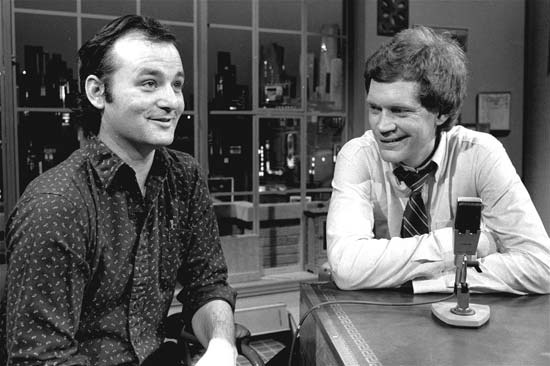Letterman, David
born April 12, 1947, Indianapolis, Ind., U.S.
 American late-night talk-show personality, producer, and comedian, best known as the host of the long-running Late Show with David Letterman.
American late-night talk-show personality, producer, and comedian, best known as the host of the long-running Late Show with David Letterman.After graduating from Ball State University (1969) with a degree in telecommunications, Letterman tried his hand at television as a crazy weatherman in Indianapolis. In 1975 he moved to Los Angeles, where he became a regular stand-up comic at the Comedy Store, a club for fledgling comedians. In 1978 he made the first of 22 appearances on The Tonight Show Starring Johnny Carson. The following year, Letterman, who had revered Carson (Carson, Johnny) since childhood, served as the show's guest host, the first of many such appearances. In 1979 the visibility Letterman gained as a guest host won him an NBC mid-morning show, The David Letterman Show. However, his unconventional humour—exemplified by the time he sent an audience member out to fetch him coffee—failed to engage daytime viewers. Although it received two Emmy Awards, the show was canceled after three months.
Letterman did not gain a following until he moved to late-night television with the critically acclaimed Late Night with David Letterman, which premiered in 1982 on NBC. The show ran immediately after Carson's The Tonight Show, and its ironic and offbeat humour was a hit with viewers. Late Night featured top-10 lists; sarcastic interplay between Letterman and his comic foil, bandleader Paul Shaffer; nonsensical skits, notably “Stupid Pet Tricks”; and roving cameras that captured ordinary people and placed them in the limelight. Letterman also became known for antagonizing some notable guests; Cher, for example, was moved to curse him on camera. If his behaviour turned off some guests, it excited the critics, who saw in his work an attempt to parody talk shows. Letterman insisted, however, that doing a funny talk show, not a parody, was his main intent. Late Night with David Letterman earned five Emmy Awards (Emmy Award) and 35 nominations.
When Carson announced his retirement in 1992, a very public search ensued for his replacement. Although it was believed that Carson favoured Letterman as host—Carson later regularly sent Letterman jokes for his monologues—NBC executives eventually chose Jay Leno, leaving Letterman in the time slot immediately after in an attempt to retain his high ratings. The following year, however, Letterman announced that he was leaving NBC to join competing network CBS. His new show, The Late Show with David Letterman (Late Show with David Letterman), was placed opposite The Tonight Show. Critics immediately questioned whether Letterman and his ironic, abrasive, flippant humour would appeal to the mainsteam audience of the earlier hour. Following its August 1993 debut, however, The Late Show with David Letterman put that concern to rest by drawing considerably more viewers than Jay Leno's The Tonight Show, which, under Carson, had reigned for three decades as the leading American late-night offering.
In 1995 Letterman hosted the Academy Awards ceremony, and his performance—which included a running gag involving the first names of Oprah Winfrey and Uma Thurman—earned mixed reviews. That year also saw his Late Show lose its ratings edge over The Tonight Show, which began to consistently attract more viewers. In January 2000 Letterman underwent emergency quintuple heart bypass surgery. During his recovery, various performers, including Bill Cosby (Cosby, Bill), served as guest hosts. His emotional return in February was among the show's highest-rated episodes. On Feb. 1, 2007, Letterman celebrated 25 years as a late-night talk-show host.
Letterman also ran his own film and television production company, Worldwide Pants. Its shows included the hit sitcom Everybody Loves Raymond (1996–2005).
- Thaxter, Celia Laighton
- Thea Astley
- Theaceae
- The Actors Studio
- The Acts of the Apostles
- Theaetetus
- The Age
- the agricultural sciences
- the Allman Brothers Band
- Thea Musgrave
- the Andrews Sisters
- The Andy Griffith Show
- the Animals
- The Antiquities of the Jews
- The Anti-Suffragist
- the Apostle Paul, Saint
- the Apostle, Saint Paul
- The Architects Collaborative
- the arts
- The Atchison, Topeka and Santa Fe Railway Company
- The Atlanta Journal-Constitution
- The Atlantic Monthly
- theatre
- theatre, African
- Theatre Guild